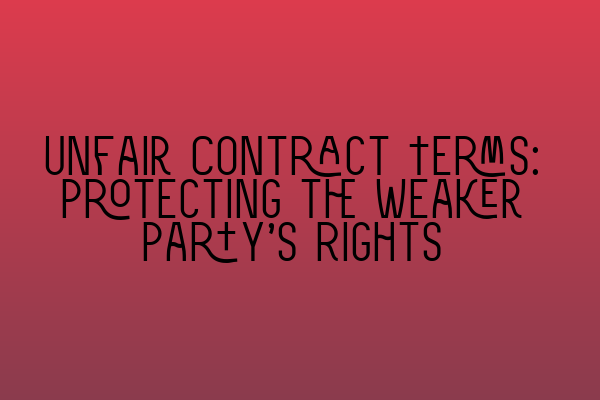Unfair Contract Terms: Protecting the Weaker Party’s Rights
Contracts are an integral part of our daily lives. From signing a lease agreement for a rental property to purchasing goods and services, contracts govern numerous transactions. However, there are instances where one party may hold a stronger bargaining position, leading to the inclusion of unfair contract terms that can exploit the weaker party. In such cases, it is crucial to understand the concept of unfair contract terms and the legal protections available to safeguard the rights of the weaker party.
What are Unfair Contract Terms?
Unfair contract terms refer to clauses or provisions within a contract that are deemed to be one-sided, oppressive, or unreasonable to the weaker party. These terms are often hidden within lengthy and complex contracts, making it challenging for individuals to identify and assess their implications fully. Unfair contract terms can include clauses that limit liability, unfairly transfer risks, or restrict the weaker party’s legal rights.
Understanding the Weaker Party
In contract law, the weaker party typically refers to an individual or organization that has significantly less bargaining power, knowledge, or resources compared to the other party. The weaker party may be a consumer, an employee, or a small business. Due to the power imbalance, the weaker party may be in a vulnerable position and at risk of being taken advantage of through unfair contract terms.
Legal Protections against Unfair Contract Terms
The law recognizes the need to provide protection to the weaker party in contractual relationships. Various legal mechanisms aim to nullify or mitigate the impact of unfair contract terms. One such mechanism is the Unfair Contract Terms Act 1977, which applies to contracts that involve the sale of goods, the supply of services, or the hire or lease of goods.
This legislation allows the weaker party to challenge any contract term that is considered unfair and unreasonable. The court examines the specific term’s content and the overall context to determine its fairness. If a term is deemed unfair, it may be rendered null and void, or the court may impose minimum standards of reasonableness upon it.
Furthermore, consumer protection laws, such as the Consumer Rights Act 2015, provide additional safeguards for consumers by setting out rules and regulations relating to unfair contract terms. These laws ensure that consumers are not unfairly restricted or disadvantaged by contract terms that are heavily biased towards the stronger party.
Seeking Legal Advice
It is essential for individuals or organizations entering into contracts to seek legal advice, particularly if they perceive themselves to be the weaker party. Consulting with a qualified solicitor who specializes in contract law ensures that all terms are fair, reasonable, and in compliance with the law.
Solicitors are well-versed in contract law and can provide valuable insights and guidance throughout the contract negotiation and drafting process. They can also review existing contracts to identify and address any unfair terms that may already be in effect.
Conclusion
Protecting the rights of the weaker party in contractual relationships is of utmost importance. Unfair contract terms can have significant consequences, resulting in financial losses, limited legal recourse, or the erosion of basic rights.
It is crucial for individuals and organizations to be aware of their rights and the legal protections available to them. Seeking advice from a solicitor who specializes in contract law is a prudent step to ensure that contracts are fair, reasonable, and in compliance with the law.
Remember, fair contracts not only protect the weaker party but also foster trust, transparency, and long-term relationships between parties.
